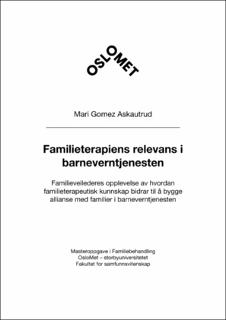Familieterapiens relevans i barneverntjenesten: Familieveilederes opplevelse av hvordan familieterapeutisk kunnskap bidrar til å bygge allianse med familier i barneverntjenesten.
Master thesis
Published version
Permanent lenke
https://hdl.handle.net/11250/3098040Utgivelsesdato
2023Metadata
Vis full innførselSamlinger
Sammendrag
Denne masteroppgaven er en kvalitativ studie basert på intervjuer med fire familieveiledere i barneverntjenesten, som har utdanning i familieterapi. Målet med oppgaven er å utforske familieveilederes perspektiv på hva familieterapien tilfører arbeidet med barn og familier i en barnevernkontekst. Oppgaven tar for seg følgende problemstilling:
Hvordan opplever familieveiledere i barneverntjenesten at familieterapeutisk kunnskap bidrar til å bygge allianse i arbeidet med familier?
Resultatene viser at familieterapeutisk kunnskap og prinsipper brukes i stor grad av familieveilederne i deres måte å tenke, snakke og møte familier på. Prinsippene anses som betydningsfulle for å oppnå en allianse mellom familien og familieveilederen. Informantene viser til en holdningsendring når det gjelder hvem som sitter på gyldig kunnskap. Med dette vises det til et skifte i at egen kunnskap er den mest sentrale for samtalen og at de forsøker å gjøres familien kunnskap mer tilgjengelig i samtaler.
Resultatene viser at familieveilederne ønsker å møte familiene der de er, ved å tilpasse hjelpen ut ifra familiens motivasjon, ønsker for mål og deres synspunkter knyttet til rammene for tiltaket. Informantene er samlet i en forståelse av at deres jobb er å skape et samarbeidsprosjekt med familiene og at dette er avgjørende for å få til endring i familier. Videre viser resultatene at et ressurs- og mestringsfokus er sentralt for arbeidet deres, og at de på denne måten fremmer familiens håp. Gjennom reflekterende samtaler tydeliggjøres familiens mulighet til å komme til egne løsninger på sine problemer. This master’s thesis is a qualitative study based on interviews with four family advisers in the child protection service- with education in family therapy. The aim of this study is to explore family advisers’ perspective on what family therapy has to offer in the work with children and families- in the context of child protection. The thesis attempts to answer the following issue:
How do family advisers in child protection services experience that knowledge of family therapy contributes to creating alliances while working with families?
The results show that knowledge and principles in family therapy is used on a large scale by family advisers in the way they think, speak and receive families. The principles are considered having significant value when creating an alliance between the families and the family advisor. The informants show a change in attitude concerning who possesses valid knowledge. With this they refers to a change in thinking that their knowledge is the most important and that they try to make the family’s knowledge more available.
The results show that the family advisers wish to meet the families where they are; by customising the help based on the family’s motivation, their desired goals, and their views concerning the framework of the intervention. The informants have a common understanding that their work is to create a collaboration with the families, and that this is crucial to make changes in the family. The results further show that a focus on resources and mastering is central in their work, and in this way they increase the family’s hope. Trough reflective conversations of the problems; the family’s possibility of solving their own problems becomes evident.
